During the holidays I had some time and picked up Democracy 3 in a Steam-sale for a few Euros. Democracy 3 is a splendid democracy simulator by Positech Games and particularly insightful for studying how policies, voters and outcomes are connected. You can choose to be the head of state of several countries (USA, UK, Germany, France, Canada and Australia) and the game lets you choose freely how you will manage the daily affairs. Your aim of a politician is A) to become popular so that you can get reelected, B) pass policies that make your country better whereas it is completely open what this means. You can govern completely ad-hoc in a Merkelian style (which did not work out for me!) or have a plan for a communist, neoliberal or surveillance utopia in mind. To test the extreme types and see what happens was the most fun for me. The game is turn-based which means that you only can do a certain amount of changes in one turn (which resembles a quarter of a year). After each turn new events happen, like international financial crisis or conflicts and you will be forced to make controversial decisions, for example banning land mines or animal testing. You cannot make these decisions light-heartedly because you have to keep in mind the basic mechanics of policy-making. This is what makes the game a good educational tool for students but also for political scientists.
[youtube https://www.youtube.com/watch?v=JjNTeqvd_qk]
For example you have to be aware that every policy costs money and that you have to monitor your income/debts balance. Every act of welfare needs to be financed somehow or otherwise you will become bankrupt. You also have to be aware that every policy costs political capital that you only get, if your core voters are happy with you. Greater political capital means that you can pass controversial policies like a carbon emission tax more easily. Of course, every decision has consequences. A CO2 tax will reduce your carbon emissions and make your country greener, whereas certain types of voters, mainly Capitalists will be very unhappy as a result of this, whereas Green supporters are going to love you. Additionally, your ministers will intervene if your policies do not reflect their core voters. You always have to balance the interests of your voters and ministers because they can turn against you and radicalize or even start city riots.
Every policy you adopt will have some type of consequences: cutting back military spending or international aid will result in embassy attacks. Adopting high education programs result in an educated society and allows you to adopt high-tech policies such as robotics, which in turn increase the risk of cyber-crime, which costs you money. So there is a lot of opportunity to test out different policies and the impact they will have.
Building my Utopia
This got me thinking: What would be the BEST for my digital voters, for me as a digital politician, for the country itself and for the world? I decided on the following political goals and principles:
- Increase economic growth and reduce debts in order to finance the following initiatives.
- Get the best education and free education in the world, with free university access and high science and research funding which results in being a high-tech nation.
- Decrease crime rates.
- Decrease unemployment rates.
- Have a high degree of social equality and a high basic income and minimum wage.
- The economy must be environmental friendly and as green as possible.
- Increase foreign aid for third party countries. Change to voluntary military service.
- Have the best welfare system with high degrees of public health.
- Stay in office as long as possible.
- Do not engage in any surveillance practices and stick to the rule of law.
- Separate church and state and ban creationism from public schools.
- Get a space program! Because? Spaaaace, final frontier, developing mankind etc. You get the idea!
What did I do to reach these goals? I started the game with three major problems: the global economy was in a recession, public obesity was up and health low and the crime rate was high. I managed to solve these problems with increasing the police force to the maximum (and giving them high wages!) with a strong focus on community work (instead of adopting cheap data-retentation programs). I also banned all domestic weapons sales. I increased taxes for tobacco and alcohol consumption and set the minimum consumption age to 21, which made me highly unpopular in the electorate. I legalized Cannabis and adopted a high tax on it. With the surplus income from the drug-taxes initiative I financed a strong public health program, public housing and research funding with university grants for every student. The electorate loved it and forgot about the high priced tobacco. As a result, public health increased and the crime rate went down.
In order to stimulate the economy I implemented micro-electricity-generation grants and invested in rural development as well as in infrastructure. Also I gave out grants for small-business creation, which significantly increased productivity and reduced unemployment and made my capitalist voters happy. I heavily invested into research and robotics, which gave a bonus as a high-tech country. I allowed stem-cell research and outraged my religious voters but on the other hand it reduced unemployment. I got reelected and in my second term I started to address the big issues. I started a social redistribution program: increased inheritance, high-income and corporation taxes which allowed me to invest in bigger initiatives in order to clean up the environment which still affected public health (asthma). I launched a hybrid car initiative, subsidized bio-fuel and alternative energy and subsidized public transports, giving every child a free bus pass and subsidized cheaper railway tickets. This reduced car usage and helped to reduce CO2 Emissions. I invested heavily in public education. Overall, with these measures I both stimulated the economy, reduced unemployment and establish a green economy. With all these measures I managed to keep a positive income/expenditure balance. I spent a few rounds to do nothing, just allowing policy proposals that come in at the end of every round. I banned fracking, land-mines and wiretapping. I reduced the military to protect my embassies only and even adopted voluntary military service. This made my Patriots unhappy but to compensate I dramatically increased foreign aid and development. Basically I followed the Swedish role model: establish a solid welfare state, clean up your house and then make the world a better place with green and international politics.
After a while the technology and education investments started to pay-off: productivity increased and my managed to earn a significant surplus income which allowed me to pay back all my state-debts and also launch new welfare initiatives like state-housing, free health-care for everyone and childcare provision. The voters, except the Capitalists, loved it. This allowed me to ban Creationism from schools, which radicalized Catholics. I also adopted a CO2 emission tax, which corporations hated. Finally I was able to launch a space program with the aim to build a new space-station (spaaaace!). Meanwhile, being a high-tech nation, cybercrime gained momentum. I bumped up the spending for intelligence services because I also got reports of radical capitalist planning a coup or a political assassination. This was the only law and order initiative I allowed: no wiretapping, no gated communities, no drones, no death penalty, no detention without trial, no censorship. I wanted to have a clean, rule-of-law supporting democracy. Unfortunately the game did not allow me to implement real democratic oversight over the intelligence services. However, the capitalist death threats remained a constant feature of my 4 consecutive terms in office and an assassination attempt failed.
Summing Up
To sum up: I managed to achieve all of my goals and the game awarded me several achievements. I reduced unemployment, got a stable, egalitarian (Egalitarian Miracle Award) and green economy (Green Utopia & Kyoto Award)). My finances were solid (Economic Miracle, Sovereign Wealth and Budget Balancer Award). My state had the best education (Intelligentsia Award) with several Nobel prizes, a space program and leadership in the high-tech market (Technological Superiority Award). With the help of taxes I managed to create a healthy society (Healthy Minds and Bodies Award). My electorate loved me (Legitimate Leader, Elder Statesmen Award) and in several elections i obliterated the opposition (Landslide Award and One Party State Award), gaining 94% in popularity ratings. This was also because I established a Crime Free Utopia (Award) without even touching any surveillance measures. In sum: I created a role model democracy and most of my voters where happy, except one type: the capitalists. In order to build my green, socialist, intelligent & health, technology utopia I had to adopt several policies which capitalists didn’t like: minimum wages, education standards, housing initiatives, inheritance and corporation taxes, food & consumption standards, CO2 tax and several more. In the end, I realized everything that is good for a society and the world in general but got assassinated by a radical capitalist Battenberg group of which my secret service warned me several times.
The moral of this story is: the world won’t become greener, more educated, more peaceful because in the end, capitalist interest will assassinate you. This was really an astonishing insight: even though the economy was thriving and I reduced public debt and also adopted several investor-friendly policies, capitalists hated me whereas the rest of the people (except the Catholics) were happy. This is the second lessons: you have to listen to the people equally and do not favor one type of interest over another for the whole time. In some cases it is necessary to adopt policies against the short-term interest of the voter and adopt policies with a long-term effect (education grants, drug taxes, CO2 tax). This requires you to adopt a certain „basta!“ mentality: giving a damn about the next election and hoping for positive effects in the future. I observed myself saying: f*ck the election, this is good for the people (increasing welfare coverage), the country (increasing education) or the planet (CO2 Tax).
Hopes for Democracy 4
Although I enjoyed playing the game it has some shortcomings that I hope get addressed in part 4.
- I played as Germany but the political system was not accurate. It simulated only a two-party system. Other party systems would be interesting as well!
- Additionally, the federal states are not mentioned. The tension between Union and federal states would be an interesting element. My education reform would not have worked in the real Germany because the federal states would have intervened.
- I would like to manage my public debt individually: increasing or decreasing it manually.
- Party politics does not matter. I haven’t played as the US but I guess mid-term elections and shifts in the different chambers of government would be really interesting. Maintaining your leadership position within the party might be an interesting challenge.
- The role of the media was limited. Although few of my ministers resigned (because I did not support their capitalist electorate) and a few produced sex-scandals, the role of the media was limited. It would be cool to have a public echo in form of simulated news-paper articles or even the opportunity to give interviews or explain your policy choices.
- All the charts have no clear units. The scientist in me demands real numbers, not just relative data.
- Wars! As an IR scholar I’am interested in international politics, wars, conferences, meetings. Al this was relatively absent (although my embassies got attacked from time to time because I reduced the military presence).
- Drafting own policies. Right now you only can choose to adopt policies that the game presents you. Drafting your own would be great. For example I missed the choice to implement better tax supervision, increasing controls for the rich or even draft bilateral agreements with off-shore financial havens.
According to Steam, the Game has moderate system requirements: 2Ghz Processor, 1GB of Ram, Graphics Card with 256MB of memory and 500MB of available disc space. It runs on Windows, MacOSX, Linux and SteamOS.
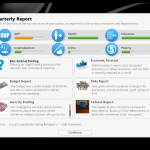
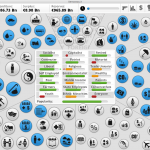
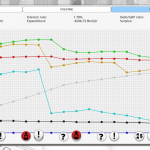
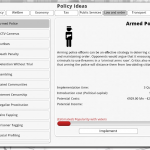
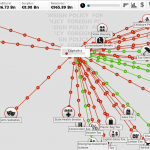
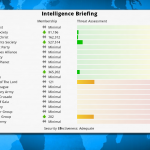

I enjoyed reading every word of this my friend!
I loved the part you saying „f*ck the election, this is good for the people (increasing welfare coverage), the country (increasing education) or the planet (CO2 Tax).“
And you are right about the world will never change. Well it just simply cannot!